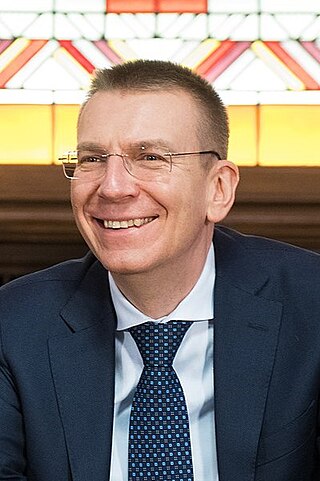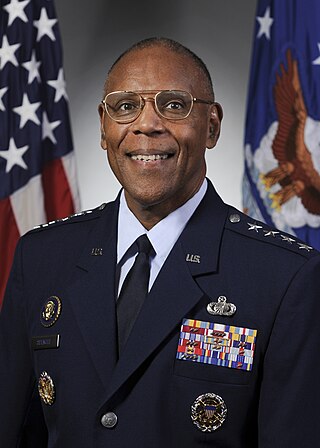
Dwight David "Ike" Eisenhower was an American military officer and statesman who served as the 34th president of the United States from 1953 to 1961. During World War II, he served as Supreme Commander of the Allied Expeditionary Force in Europe and achieved the five-star rank of General of the Army. He planned and supervised the invasion of North Africa in Operation Torch in 1942–1943 as well as the invasion of Normandy (D-Day) from the Western Front in 1944–1945.

The National War College (NWC) of the United States is a school in the National Defense University. It is housed in Roosevelt Hall on Fort Lesley J. McNair, Washington, D.C., the third-oldest Army post still active.

The National Defense University (NDU) is an institution of higher education funded by the United States Department of Defense, intended to facilitate high-level education, training, and professional development of national security leaders. As a chairman's Controlled Activity, NDU operates under the guidance of the Chairman of the Joint Chiefs of Staff (CJCS), with Lieutenant General Michael T. Plehn, USAF, as president. It is located on the grounds of Fort Lesley J. McNair in Washington, D.C.

Fort Lesley J. McNair is a United States Army post located on the tip of Greenleaf Point, the peninsula that lies at the confluence of the Potomac River and the Anacostia River in Washington, D.C. To the peninsula's west is the Washington Channel, while the Anacostia River is on its south side. Originally named Washington Arsenal, the fort has been an army post for more than 200 years, third in length of service, after the United States Military Academy at West Point and the Carlisle Barracks. The fort is named for General Lesley James McNair, who was killed in action by friendly fire in Normandy, France during World War II.

The New Look was the name given to the national security policy of the United States during the administration of President Dwight D. Eisenhower. It reflected Eisenhower's concern for balancing the Cold War military commitments of the United States with the nation's financial resources. The policy emphasised reliance on strategic nuclear weapons as well as a reorganisation of conventional forces in an effort to deter potential threats, both conventional and nuclear, from the Eastern Bloc of nations headed by the Soviet Union.
Robert Jeffrey Art is Christian A. Herter Professor of International Relations at Brandeis University, and Fellow at MIT Center for International Studies. He subscribes to the theory of neorealism, which argues that force still underlies the power structure in the modern world. He is a member of the Council on Foreign Relations, a United States nonprofit think tank specializing in U.S. foreign policy and international affairs.

The Air War College (AWC) is the senior Professional Military Education (PME) school of the U.S. Air Force. A part of the United States Air Force's Air University, AWC emphasizes the employment of air, space, and cyberspace in joint operations. Headquartered at Maxwell Air Force Base in Montgomery, Alabama, its higher headquarters is the Air Education and Training Command (AETC) at Randolph Air Force Base in San Antonio, Texas. It is one of six war colleges within the U.S. Department of Defense's Joint Professional Military Education (JPME) Phase II Education Program for commissioned officers.

The Dwight D. Eisenhower School for National Security and Resource Strategy, formerly known as the Industrial College of the Armed Forces (ICAF), is a part of the National Defense University. It was renamed on September 6, 2012, in honor of Dwight D. Eisenhower who graduated from this school when it was previously known as the Army Industrial College.

James Jay Carafano is the director of the Douglas and Sarah Allison Center for Foreign Policy Studies and vice president of the Kathryn and Shelby Cullom Davis Institute for International Studies at The Heritage Foundation. Carafano is also an adjunct professor at the Institute of World Politics.

Frank Graham Klotz served as Under Secretary of Energy for Nuclear Security and Administrator for the National Nuclear Security Administration of the U.S. Department of Energy. He was confirmed for the position on April 8, 2014, and retired on January 20, 2018.

Janet Carol Wolfenbarger is a retired United States Air Force four-star general who served as the eighth commander of Air Force Materiel Command from June 5, 2012, to June 8, 2015. She was the first woman to achieve the rank of four-star general in the Air Force. Wolfenbarger retired from the Air Force after over 35 years of service.

Kevin J. Jacobsen is a United States Air Force retired Brigadier General who served as the 16th Commander of the Air Force Office of Special Investigations (AFOSI), Quantico, VA. This field operating agency is responsible for providing commanders of U.S. Air Force activities independent, professional investigative services regarding fraud, counterintelligence, and major criminal matters. The investigations are conducted by a worldwide network of military and civilian special agents stationed at major U.S. Air Force installations and a variety of special operating locations.

Wendy Lee Motlong Masiello retired as a lieutenant general in the United States Air Force on May 24, 2017. From May 2014 to May 24, 2017, she was the director of the Defense Contract Management Agency, based in Fort Lee, Virginia.
Alan Freese Wilt was Professor Emeritus of History at Iowa State University.

Edgars Rinkēvičs is a Latvian public official and politician, currently serving as the Minister of Foreign Affairs of Latvia, a role he has held since 2011. Before beginning in this role, he served as head of the Chancery of the President of Latvia, as State Secretary of the Ministry of Defence, as well as a deputy of the Saeima.

Larry Oneil Spencer is a retired United States Air Force general who served in many command, comptroller, and leadership roles during the course of his career. Some of his leadership roles included being the Vice Chief of Staff of the United States Air Force, commander of the 75th Air Base Wing at Hill AFB, commander of the 72nd Support Group at Tinker AFB, and the commander of the 4th Comptroller Squadron at Seymour Johnson AFB. He retired 1 October 2015 after more than 44 years of service. He received the Defense Distinguished Service Medal, the Air Force Distinguished Service Medal, the Defense Superior Service Medal, and the Legion of Merit.
The Fletcher School's International Security Studies Program is a center for the study of international security studies and security policy development. It was established in 1971 at The Fletcher School of Law and Diplomacy, Tufts University. ISSP conducts its academic activity through courses, simulations, conferences, and research. It also has a military fellows program for midcareer U.S. officers.

Richard H. Shultz, Jr. is an American scholar of international security studies. He is a Professor International Politics at The Fletcher School of Law and Diplomacy, Tufts University, where he is also the director of the International Security Studies Program (ISSP).

Hugh Edward Conway was a college professor and expert on labor economics and the construction industry in the United States. He held the Department of Labor Chair and taught economics at the Industrial College of the Armed Forces. He traveled extensively with military and academic groups studying construction project across the United States and around the world. Conway wrote numerous articles on a wide range of labor and economics-related subjects. He also compiled and edited several books.
Benjamin Franklin Cooling III is a professor of national security studies at Dwight D. Eisenhower School for National Security and Resource Strategy at the National Defense University in Washington DC. He is the author of more than a dozen books on the American Civil War, including a trilogy on the defense of District of Columbia, a biography of Secretary of the Navy Benjamin Franklin Tracy, and most recently Jubal Early: Robert E. Lee's Bad Old Man.
















